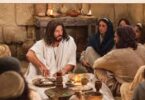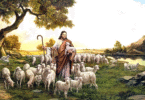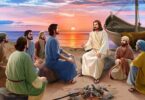4th Sunday of Advent (Year C)
Readings: Micah 5:1-4a; Ps. 80:2-3, 15-16, 18-19; Hebrew. 10:5-10; Luke 1:39-45
We are on the threshold of the Christmas celebrations, having prepared for this moment over the last few weeks. This is the final Sunday of Advent, leading up to Christmas. What is significant about this Sunday? It is the last step before entering into the mystery of the Incarnation. The appeal of the liturgy is for all: for those who have not yet fully engaged in the long preparation and for those who have been preparing all along. This is the final call before we risk missing the true meaning of Christmas.
This final call is about humility. We are called to humble ourselves in order to understand the true meaning of Christmas. Humility is a foundational virtue. It nurtures other virtues, helps us reach greater heights, builds our character, and brings happiness into our lives. But above all, today’s liturgy teaches us that humility reveals greater truths in our lives.
The Bible offers many examples of the virtue of humility, some of which are very familiar to us. Moses – His humility made him the liberator of the Hebrews from Egypt. He is known as the humblest man during his time (Numbers 12:3). King David – After sinning with Bathsheba, he was condemned to die, but it was his humility that saved him. He prayed to God for mercy (Psalm 51:1). Job – After questioning God for his suffering and arguing with his friends, he humbled himself by accepting his limitations. In doing so, he received back all his blessings (Job 42:3). Each of these figures understood a greater truth in their lives: that God loves them more than they could have imagined.
The liturgy of the Word also reveals this truth. The first reading speaks of the promised one who would come into the world to save them. The prophet Micah spoke this message 600 years before Christ, directed to Judah (the Southern Kingdom) during a time when the mighty Assyrians had conquered Samaria, the capital of Israel (the Northern Kingdom). Micah brought hope to the people amid despair, affirming that God’s plans are greater than human understanding. How did God choose David from the least of the tribes, and Bethlehem, a small village, to bring about the salvation of Israel? In the same way, God would use humble means to save His people. Micah understood that God chose David, a shepherd boy, to humble the mighty enemy. Likewise, God would use the simple and the least to deliver His people from the Assyrians.
The second reading speaks about Jesus. The author of the letter to the Hebrews, one of the last writings in the New Testament, introduces Jesus as the high priest and the ultimate sacrifice. While comparing the Old Testament sacrifices, the author affirms that Jesus gave full meaning to all the offerings of the Old Covenant. Jesus renewed everything in Himself. However, the author makes one significant revelation: as believers in Christ, we can only truly understand Jesus in the context of His death and resurrection. Jesus completely surrendered Himself to the Father’s will, even to the point of dying on the cross. It is in His humility that we come to understand who He is.
The Gospel narrates the scene of the Visitation, where Mary visits her cousin Elizabeth. There are two main figures: Mother Mary and Elizabeth. But there are also two others in the background: Jesus and John the Baptist. All four display humility. Mary was humble enough to accept the challenge of being the mother of Jesus at such a young age. Though she knew she was the mother of the Son of God, she chose to visit her cousin. She completely surrendered to God’s will. Elizabeth, in her old age, honored Mary as the mother of the Lord. Her words were filled with humility. John the Baptist also displayed humility, declaring that he was unworthy to untie Jesus’ sandals. Despite his popularity, he pointed to Jesus as the Lamb of God who takes away the sins of the world. He lived a simple, witnessing life. Each of them recognized the greatness of God in their lives. They focused on others rather than on themselves and submitted to God’s will. It is the gift of humility that revealed to them the greater truth: that Jesus is present in their lives during the first Christmas.
If we want to understand the real meaning of Christmas in our lives today, we need to be like Mary, Elizabeth, and John the Baptist. We need to humble ourselves before the Lord. Our humility will pave the way for us to recognize Jesus in our lives, our families, and our communities. However, today’s world presents many challenges to humility. These challenges include self-projection, self-promotion, pride, personal success, self-centeredness, individualism, and a competitive nature that places a high value on personal achievements. Additionally, there is often a lack of spiritual connection. In such a climate, humility is often seen as a weakness or a defeat. We fail to learn from Jesus, who, though the Son of God, humbled Himself to become a man and die on the cross to save the world from sin and death.
May this Sunday’s liturgy help us become humble enough to understand the mystery of the Incarnation this Christmas.






